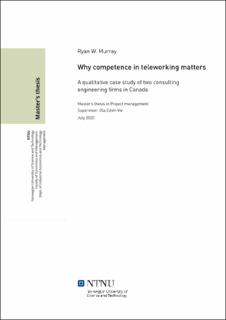| dc.description.abstract | Teleworking (also referred to as remote working) is currently rising in popularity, and based on the recent COVID-19 pandemic this trend appears likely to continue. The existing theoretical literature on teleworking indicates the importance of taking the context of teleworking into consideration. One context that has received little attention in the literature is consulting engineering firms. While teleworking theory does cover knowledge-intensive firms and consulting firms in general, minimal studies specifically address consulting engineering. This research project aims to fill that gap by answering the following research question:
How is the practice of teleworking in consulting engineering firms influenced by conditions on the job, individual, organizational, and environmental and societal levels?
A qualitative case study is conducted that includes two consulting engineering firms located in the Greater Toronto Area region of Canada. One is a small firm that purely teleworks, whereas the other is a medium-sized firm that infrequently teleworked prior to COVID-19, but transitioned to full-time teleworking during COVID-19 which is captured in the empirical data. A total of seven employees are interviewed in depth, in positions ranging from junior engineers to presidents, in order to obtain a holistic view of the teleworking practices in these firms. This research project primarily uses an inductive approach by generating theory based on the empirical data and then comparing it to the existing theoretical literature. A theoretical framework is developed that divides teleworking into four levels that structure the overall analysis and discussion: the job level, the individual level, the organizational level, and the environmental and societal level. A few key concepts within each level are examined by comparing the findings from the empirical data with existing literature.
The research reveals two main findings. First, consulting engineering firms do not appear to experience any significantly unique challenges in regards to teleworking. Secondly, teleworking literature appears to have surprisingly neglected emphasizing the importance of teleworking as a competence. This research showcases that teleworking competence influences the outcomes of teleworking at all four levels of the theoretical framework. | |
